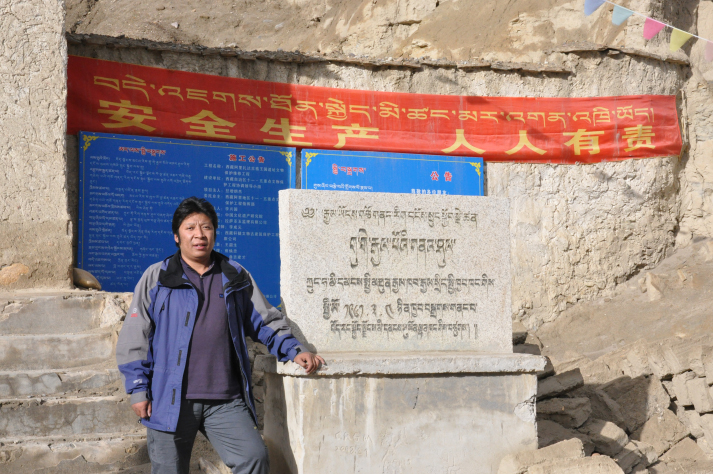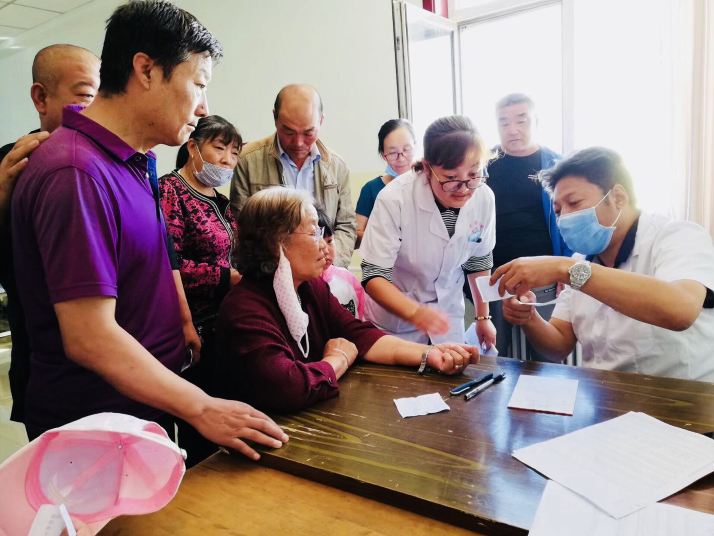|
||||||
|
||||||
| Home Nation World Business Opinion Lifestyle China Focus ChinAfrica Multimedia Columnists Documents Special Reports |
|
||||||
|
||||||
| Home Nation World Business Opinion Lifestyle China Focus ChinAfrica Multimedia Columnists Documents Special Reports |
| Nation |
| The Magic of Healing |
| A Tibetan medicine doctor's commitment and dedication to the science |
| By Li Yuan & Guo Qing · 2019-04-27 · Source: NO. 18 MAY 2, 2019 |
 Jiaojia Tsering during a field study trip in southwest China's Tibet Autonomous Region in July 2016 (XINHUA)
Born into a family of Tibetan medicine doctors, Jiaojia Tsering was destined to follow on the same path. Today a top-level physician at Beijing Tibetan Hospital, he has treated many patients from both China and abroad and has witnessed the development of Tibetan medicine over his 28-year career. To be a doctor, though, was not in Jiaojia Tsering's plan as a child growing up in southwest China's Tibet Autonomous Region. His childhood dream was to become a writer or a police officer. His grandfather was a notable doctor, but was unable to hand down his experience to Jiaojia Tsering's father before passing away. Thus, his father had a strong wish that Jiaojia Tsering learn Tibetan medicine and continue the family tradition. Jiaojia Tsering got high scores on his high school entrance exam and was able to enroll in a renowned Tibetan medicine school. Shortly after, he made up his mind to pursue a career in the field. "I came to realize how extensive and profound Tibetan medicine is in the process of learning and working, and there is a lot more to explore," Jiaojia Tsering said. After graduating from the school, he decided to further his study. Encouraged by his family, he applied to the Tibetan Traditional Medical College and was admitted. He received his master's degree and doctorate there. "In those days, there were only one or two students who were accepted in the doctoral studies at the college, and it was the only college in China with a doctoral program in Tibetan medicine," Jiaojia Tsering said. "I am lucky to have been accepted and I think it is the most important accomplishment in my life." For patients' sake In 2008, Jiaojia Tsering started working at Beijing Tibetan Hospital, a national hospital specialized in Tibetan medicine. At that time, its patients were mainly people of minority ethnic groups. He believes Tibetan medicine should not be limited to serving the residents in Tibetan-inhabited regions, but should also expand to more people. "When I started my work at Beijing Tibetan Hospital, there were not many patients," Jiaojia Tsering said. "With more people acknowledging Tibetan medicine, the number of patients has increased. In addition to patients from within the country, we also have frequent patients from abroad such as Kazakhstan and Russia." He explained that Tibetan medicine has very good effects in treating diseases of the heart, cerebral vessels, the nervous system, the digestive system, and rheumatoid and common arthritis, among others. With the support of a national Tibetan medicine research project on cardiovascular and cerebrovascular diseases, Jiaojia Tsering said Tibetan medicine has made many breakthroughs in treating these diseases. First, the clinical efficacy of Tibetan medicine has been improved, with a number of positive clinical proofs; second, the advantages of Tibetan medicine in these fields have been more focused and prominent, and the effect of improving some symptoms during the convalescent period is better than that of Western medicine; third, comprehensive treatment methods for oral and external use are more standardized; and lastly, some preliminary results have been achieved in therapeutic mechanisms. Tibetan medicine has come across some challenges in its application. For example, since the expenditures on some of its unique treatment methods are not reimbursed by the national basic medical insurance, they have not been widely used despite their proven effectiveness. In light of these problems, Jiaojia Tsering and his team have explored many aspects of Tibetan medicine to find solutions. They have intensified research on traditional therapies, including collecting written records and standardizing techniques. They have initiated several experiments to confirm the therapeutic mechanism of Tibetan medicine in cardiovascular and cerebrovascular diseases, and completed many high-level papers based on the results of their research. They also set up the first Tibetan pharmacy in Beijing to encourage Tibetan clinicians to prescribe traditional medicine. In addition, they have worked with top-ranking research teams in China to develop advanced Tibetan medical instruments and obtained a series of patents and software copyrights. "I hope Tibetan medicine can benefit more patients from our efforts." Jiaojia Tsering said.  Jiaojia Tsering (right) prescribes Tibetan medicinal herbs to patients in September 2018 (XINHUA)
Future development "Tibetan medicine doctors of my generation are lucky to be thriving during a good period for the development of the science," Jiaojia Tsering said. "Since democratic reform was launched in Tibet in 1959, the Central Government and local authorities at various levels have attached great importance to the development of Tibetan medicine and provided great support through financing and policy guarantees. Tibetan medicine has developed vigorously in many aspects including the cultivation of practitioners, studies of fundamental theories, research and development of herbal medicine." One advantage of traditional Tibetan medical treatment is that prescriptions are made from herbs, making them flexible to adjust. But now, due to the difficulty of obtaining high-quality Tibetan medicinal herbs, doctors sometimes use other patent drugs which impact the effects of the treatment. Regarding the best way to hand down and preserve Tibetan medicine, Jiaojia Tsering said efforts should be made in areas such as protecting its natural resources, passing on the experiences of notable doctors, and strengthening the protection of intellectual property rights. His other suggestions include compiling a list of protected historical relics, intangible culture and related files and written materials; providing financial support for senior experts to share their experiences and filming their classes; establishing a strict system for the protection of endangered Tibetan medicinal herbs and designating a reserve area for herbal resources; and banning destructive excavation. In recent years, Beijing Tibetan Hospital has implemented a series of measures promoting the inheritance and development of Tibetan medicine. It has held training sessions for nine consecutive years, inviting top experts to give lectures to students from all over the country, Jiaojia Tsering said. To date, it has trained about 1,500 professionals in Tibetan medicine and gained praise from the trainees. Jiaojia Tsering hopes that more colleges and universities will provide a major or courses on Tibetan medicine in the future so that more well-trained practitioners will emerge and promote the development of the science. The article was first published in Potala magazine. The authors are reporters with the magazine Copyedited by Rebeca Toledo Comments to zanjifang@bjreview.com |
About Us | Contact Us | Advertise with Us | Subscribe
|
||
| Copyright Beijing Review All rights reserved 京ICP备08005356号 京公网安备110102005860号 |